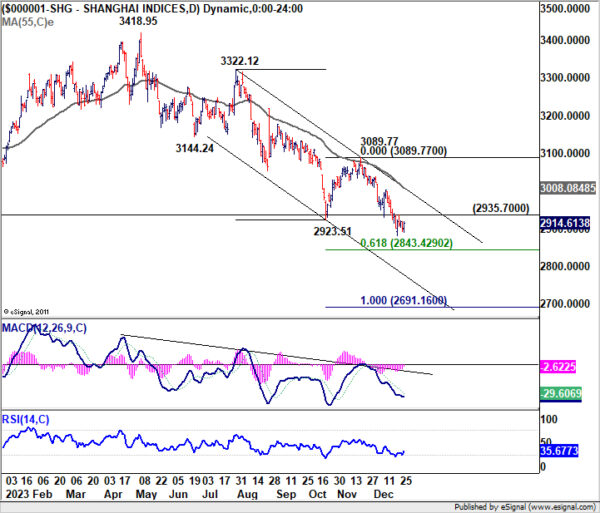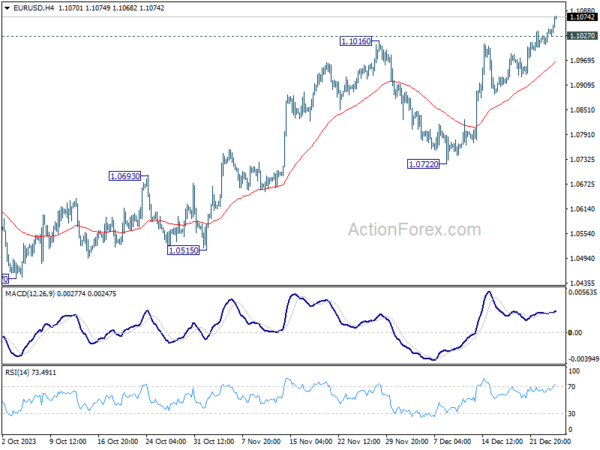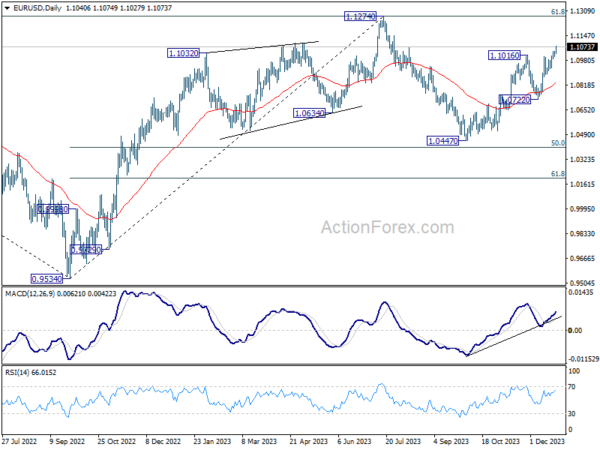In today’s subdued trading environment, Sterling Euro have emerged as the strongest currencies, outperforming Australian Dollar and New Zealand Dollar. The ascendancy of these European currencies does not appear to be driven by any specific fundamental factors. Instead, it seems to be part of a rotational trend where different currencies take turns rallying against Dollar and Japanese Yen. Currently, it is the turn of Euro and Pound to experience this upward movement.
Australian Dollar also remains firm, supported by a general recovery in risk sentiment across Asian markets. However, the currency’s momentum is somewhat limited. This restraint indicates that investors are maintaining a cautious stance towards China’s economic recovery. Despite recent positive indicators, there seems to be a preference for a wait-and-see approach during the holiday period. Market participants are likely looking for further evidence to confirm the sustainability of China’s recovery, with the upcoming PMI data this Sunday being a potential catalyst. The outcome of this data may play a crucial role in shaping investor engagement and market dynamics at the start of January.
In Europe, at the time of writing, FTSE is up 0.65%. DAX is up 0.40%. CAC is up 0.30%. Germany 10-year yield is down -0.0505 at 1.913. UK 10-year yield is down -0.031 at 3.471. Earlier in Asia, Nikkei rose 1.13%. Hong Kong HSI rose 1.74%. China shanghai SSE rose 0.54%. Singapore Strait Times rose 0.98%. 10-year JGB yield fell -0.0349 to 0.599.
China’s Shanghai SSE recovers, but risks remain on the downside
China’s Shanghai SSE recovered mildly by closing up 0.54% earlier today. Sentiment was lifted by data from showing that industrial profits saw a substantial year-on-year jump of 29.5% in November, a significant acceleration from the modest October’s 2.7% growth.
However, there is no change in outlook of SSE for now. As long as 2935.70 resistance holds, fall from 3089.77 should still extend further to 61.8% projection of 3322.12 to 2923.51 from 3089.77 at 2843.42.
Break of 2935.70 would indicate short term bottoming and bring stronger rebound. In this case, the key hurdle will be 55 D EMA (now at 3008.08) which is close to medium term trend line resistance, as well as 3000 psychological level.
BoJ’s Ueda: Policy adjustment possible with strengthened wage-price relationship
BoJ Governor Kazuo Ueda, in a speech yesterday, acknowledged that while the probability of achieving the central bank’s price target is gradually increasing, it is still not high enough to justify a change in the current monetary policy.
Ueda highlighted, “The likelihood of Japan’s economy getting out of the low-inflation environment and achieving our price target is gradually rising, though the likelihood is still not sufficiently high at this point.”
The Governor pointed out the significant uncertainties surrounding economic and price conditions both domestically and internationally. He emphasized the importance of observing how firms’ wage- and price-setting behaviors evolve in response to these conditions.
Ueda also mentioned that “we will likely considering changing policy,” if there is significant strengthening of the virtuous cycle between wages and prices, leading to a sustainable and stable likelihood of achieving BoJ’s price target.
BoJ’s Dec meeting highlights lack of urgency in tightening
Summary of Opinions of BoJ’s December 18-19 meeting revealed a prevailing view among the board members on a lack of urgency in tightening monetary policy. The consensus was that delaying the decision to tighten poses minimal risk. This general sentiment indicates BoJ’s preference for a measured approach, prioritizing stability and sufficient data before considering changes.
The summary acknowledged that the sustainable and stable achievement of price stability target, set at 2%, is not yet certain. In considering whether to end the negative interest rate policy and yield curve control framework, the board stressed the importance of confirming a virtuous cycle between wages and prices.
To reach the 2% inflation target sustainably, one member noted that “growth momentum in nominal wages needs to strengthen further”. It’s also noted that wage growth has not kept pace with inflation. And, even with potentially higher wage hikes in the spring, the risk of inflation significantly surpassing 2% remains “low”. Current policy approach does not risk “falling behind the curve” in response to inflation dynamics.
The summary also noted that acknowledged that the need to “rapidly tighten monetary policy is small”. At the same time, “the cost incurred if this risk materializes would be significant.”
EUR/USD Mid-Day Outlook
Daily Pivots: (S1) 1.1020; (P) 1.1032; (R1) 1.1056; More…
EUR/USD’s rally continues today and hit as high as 1.0749 so far. Intraday bias remain son the upside for retesting 1.1274 high. Strong resistance should be seen from there to limit upside, at least on first attempt. On the downside, below 1.1027 minor support will turn intraday bias neutral first. But further rally will remain in favor as long as 1.0722 support holds, in case of retreat.
In the bigger picture, price actions from 1.1274 are viewed as a corrective pattern to rise from 0.9534 (2022 low). Rise from 1.0447 is seen as the second leg. While further rally could cannot be ruled out, upside should be limited by 1.1274 to bring the third leg of the pattern. Meanwhile, sustained break of 1.0722 support will argue that the third leg has already started for 1.0447 and below.
Economic Indicators Update
| GMT | Ccy | Events | Actual | Forecast | Previous | Revised |
|---|---|---|---|---|---|---|
| 23:50 | JPY | BoJ Summary of Opinions | ||||
| 05:00 | JPY | Housing Starts Y/Y Nov | -8.50% | -4.30% | -6.30% | |
| 09:00 | CHF | Credit Suisse Economic Expectations Dec | -23.7 | -29.6 |



